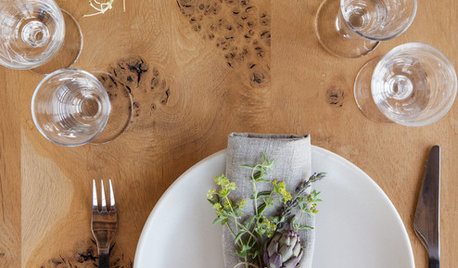'The bitter element'
paulns
18 years ago
Related Stories

HOUZZ TOURSHouzz Tour: A Rammed-Earth House Built to Brave the Elements
New Zealand architects take on a dual challenge — build a home that feels enclosed and keep it open to sweeping mountain views
Full Story
REMODELING GUIDESHouzz Tour: Baroque Minimalism in New Jersey
Modern furniture meets ornate elements in a 19th-century Hoboken brownstone, renovated with respect for its original features
Full Story
KITCHEN OF THE WEEKKitchen of the Week: Scads of Storage in 110 Square Feet
Farmhouse, modern and eco-friendly elements meet in this Pacific Northwest home
Full Story
ARCHITECTUREHow Thermal Mass Keeps You Warm and Cool
Passive solar design makes use of this element. Here’s how it works and how you can get it in your home
Full Story
GARDENING GUIDESWindy English Plot Becomes a Kitchen Garden
A garden in Derbyshire’s Peak District combines practical elements and beautiful design
Full Story
LIVING ROOMSNew This Week: 3 Sunrooms Straight Out of Our Dreams
Heated floors, comfy furniture and walls of windows make these recently uploaded sunrooms the places of our sun-drenched fantasies
Full Story
ARCHITECTUREHave Your Flat Roof and Your Snow Too
Laboring under the delusion that flat roofs are leaky, expensive and a pain to maintain? Find out the truth here
Full Story
DECORATING GUIDESDecorating With Nature in Fall and Winter
Bringing the beauty of the changing seasons inside is easy and inexpensive. Here are 16 ideas to get you started
Full Story
CONTEMPORARY HOMESHouzz Tour: A Stunning Church Conversion in Chicago
A former Methodist church built in 1901 finds new life as an awe-inspiring family home
Full Story
MOST POPULAR8 Backyard Ideas to Delight Your Dog
Cue the joyous soundtrack. These pet-friendly landscape and garden ideas will keep your pooch safe, happy and well exercised outdoors
Full Story





Ina Plassa_travis
paulnsOriginal Author
Related Professionals
Windham Landscape Architects & Landscape Designers · Seabrook Landscape Architects & Landscape Designers · Allentown Landscape Contractors · Bethel Park Landscape Contractors · Concord Landscape Contractors · Fort Atkinson Landscape Contractors · Marlborough Landscape Contractors · Mesa Landscape Contractors · Morrisville Landscape Contractors · Red Oak Landscape Contractors · Carol Stream Carpenters · Bronx Roofing & Gutters · Orlando Roofing & Gutters · Thousand Oaks Roofing & Gutters · Washington Roofing & GuttersDaisyduckworth
Phylla
paulnsOriginal Author